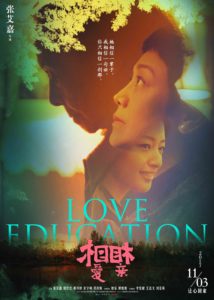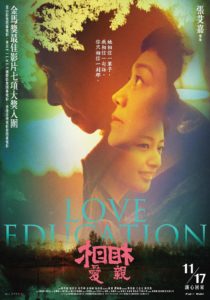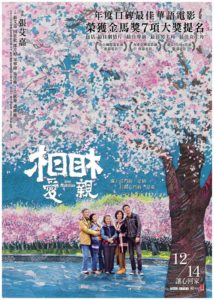Love Education
相爱相亲
Hong Kong/China/Taiwan, 2017, colour, 2/35:1, 120 mins.
Director: Zhang Aijia 张艾嘉 [Sylvia Chang].
Rating: 6/10.
Family drama hung on the moving of a relative’s grave is pleasant but dramatically unfocused.
A city in Henan, central China, the present day. Yue Huiying (Zhang Aijia), a high-school teacher on the verge of retirement, is, along with her family, at the bedside of her mother Yue Shuhui (Wang Liyuan) when the latter dies in hospital. Yue Huiying claims her mother’s last words were for the grave of her late husband, Yue Zifu (Jia Xiang), to be moved from his home village to the city so they can lie together. Yue Huiying’s husband, driving instructor Yin (Tian Zhuangzhuang), says he heard nothing and her daughter Yin Weiwei (Lang Yueting) says she just heard her grandmother say “Huiying”. Despite that, all three drive to the village where Yue Zifu’s grave is tended by his  first wife, Yue Zengshi (Wu Yanzhu), who refuses to have his body removed to the city. Born in 1928 in Hunan province, Yue Zengshi married Yue Zifu at the age of 17 but, after a few months, he left for the city to find work because of famine in the countryside – and never returned, staying to marry Yue Shuhui and dying in 1996. The local villagers all support Yue Zengshi’s decision. Back in the city, and unknown to her mother, Yin Weiwei tells the story to her colleagues at Activity TV and a news crew goes to the village. Yue Huiying becomes branded as Yue Zifu’s “love child” who wants his grave moved. Meanwhile, Yin Weiwei has her own problems with her boyfriend, pub singer Da (Song Ningfeng), who wants to move on to Beijing to further his career and is visited by a female childhood friend, Zhu Yin (Tan Weiwei), who’s come from Xi’an for a singing competition and has a
first wife, Yue Zengshi (Wu Yanzhu), who refuses to have his body removed to the city. Born in 1928 in Hunan province, Yue Zengshi married Yue Zifu at the age of 17 but, after a few months, he left for the city to find work because of famine in the countryside – and never returned, staying to marry Yue Shuhui and dying in 1996. The local villagers all support Yue Zengshi’s decision. Back in the city, and unknown to her mother, Yin Weiwei tells the story to her colleagues at Activity TV and a news crew goes to the village. Yue Huiying becomes branded as Yue Zifu’s “love child” who wants his grave moved. Meanwhile, Yin Weiwei has her own problems with her boyfriend, pub singer Da (Song Ningfeng), who wants to move on to Beijing to further his career and is visited by a female childhood friend, Zhu Yin (Tan Weiwei), who’s come from Xi’an for a singing competition and has a  young son named after him. Yin Weiwei becomes jealous of their friendship. In the meantime, Yue Huiying threatens to sue Yue Zengshi for possession of Yue Zifu’s body, but first needs to legally prove her parents were married back in 1953. However, the documents appear to have disappeared over the years, as too have those proving Yue Zifu’s marriage to Yue Zengshi.
young son named after him. Yin Weiwei becomes jealous of their friendship. In the meantime, Yue Huiying threatens to sue Yue Zengshi for possession of Yue Zifu’s body, but first needs to legally prove her parents were married back in 1953. However, the documents appear to have disappeared over the years, as too have those proving Yue Zifu’s marriage to Yue Zengshi.
REVIEW
Smoothly mounted and passably played, Love Education 相爱相亲 is a film of nice individual moments that don’t really add up to a sustained feature-length drama. For her first movie set and shot in the Mainland, veteran Taiwan actress-filmmaker Zhang Aijia 张艾嘉 [Sylvia Chang] has tried to stuff too much into the pot, with the result that it’s a stew of many flavours but no dominant one – part drama, part light comedy, part love story, all hung on a married woman’s determination to see her recently deceased mother reunited in a single grave with her late husband. Financed by Mainland and Taiwan money, it sank on release in the former, with only RMB18 million – though that was still more than the Mainland box office of Zhang’s last directorial outing, the very fine Murmur of the Hearts 念念 (2015, RMB14 million).
Almost all of Love‘s problems stem from the over-egged script, developed by Zhang and Chengdu writer You Xiaoying 游晓颖 from an original screenplay by the latter based on her own family’s story. At various times, the film looks like becoming (a) a family drama centred on generational differences between mother and daughter; (b) a portrait of town vs. country attitudes to death and burial; (c) a light satire – in the vein of earlier films by Huang Jianxin 黄建新 (e.g. The Marriage Certificate 谁说我不在乎, 2001) – on Mainland bureaucracy, as the mother tries to prove her parents’ marriage was legal; (d) an examination of female love and jealousy, as both mother and daughter fall prey to unjustified suspicions over their nearest and dearest; (e) a swipe at the exploitative nature of the mass media; and (f) a portrait of a mother who needs a cause to fight for as she approaches retirement and a feeling of emptiness. In practice, it’s all of these, but with no strong dramatic spine to make the themes register emotionally. Only in the last few scenes, of the husband and wife chatting in a car, and the father’s remains being disinterred, does Love finally have some clout.
Zhang’s films as a writer-director have all been centred on metaphysical issues – family, friendship, buried emotional scars, the need to let go – and in that respect Love, her 10th feature as a solo director, is in the same line. But, maybe because of the unfamiliar Mainland setting, maybe because of trying to latch too much onto an original screenplay, the movie ends up as neither fish nor fowl, and doesn’t measure up to her best work like Siao Yu 少女小渔 (1995), Tonight Nobody Goes Home 今天不回家 (1996), 20 30 40 (2004) and Murmur of the Hearts.
On a performance level it’s largely fine. Concert pianist-turned-actress Lang Yueting 朗月婷, 32, so good as the peasant mute in Mountain Cry 喊•山 (2015) and okay in the musical Office 华丽上班族 (2015), written by and starring Zhang, is fine as the annoyingly self-centred daughter, even though she’s given few redeeming characteristics and her relationship with a singer (flatly played by Song Ningfeng 宋宁峰) never convinces. In a rare acting role, veteran director Tian Zhuangzhuang 田壮壮, 65, is suitably mellow as the tolerant husband, even though one yearns to know more about what makes him tick. Strongest of all is 79-year-old actress Wu Yanshu 吴彦姝 – last seen on screen in Book of Love 北京遇上西雅图之不二情书 (2016), as one of the old codgers whose property is targeted for redevelopment – as the first wife who refuses to have the husband’s grave moved. With the minimum of dialogue, Wu creates an utterly convincing, very moving performance of an old woman who hangs on to the memory of her arranged marriage all those years ago, despite it effectively lasting only a few months.
Ironically, the weakest of the lead performances is that by Zhang herself. Despite eliding her Taiwan accent, she just looks and sounds wrong as a Henan wife/mother, in small ways difficult to describe; where the others look at home, Zhang always looks as if she’s giving a performance, and the script, instead of properly backgrounding the demons that drive her ratty character, more often cops out with light comedy. Apart from in 20 30 40, the now 64-year-old film-maker has rarely been at her best as an actress in her own productions, and Love cries out for a veteran Mainland actress like Lv Liping 吕丽萍 to handle the important central role more authentically.
Cameos pepper the cast, including Geng Le 耿乐 as the father of a troublesome high-school pupil, Wang Zhiwen 王志文 as a town-hall bureaucrat and Taiwan actress-singer Liu Ruoying 刘若英 [René Liu] (a Zhang regular) as a ditzy pupil of the driving-instructor husband. Entertaining as they all are, however, their playfulness is yet another distraction from the main drama.
On a technical level, things are fine, with clear widescreen images by Taiwan ace Li Pingbin 李屏宾 [Mark Lee] in both town and country, with moments of atmosphere in the first wife’s rural home, and gentle underscoring by Taiwan singer-composer Huang Yunling 黄韵玲 using frets and strings. Editing by France’s Matthieu Laclau – better known for artier films like Mr. Tree Hello!树先生, (2011), A Touch of Sin 天注定 (2013), Trap Street 水印街 (2013) or K (2015) – is trim and fluid. Locations were in Zhengzhou and Luoyang, Henan province. The original Chinese title is a riff on the four-character phrase 相亲相爱, meaning a devoted love for one another.
CREDITS
Presented by Beijing Hairun Pictures (CN), Dream Creek Production (TW). Produced by Unique Films International (HK).
Script: Zhang Aijia [Sylvia Chang], You Xiaoying. Photography: Li Pingbin [Mark Lee]. Editing: Matthieu Laclau. Music: Huang Yunling. Production design: Wen Nianzhong [Man Lim-chung]. Art direction: Yu Junjie. Sound: Tang Xiangzhu, Du Duzhi, Wu Shuyao.
Cast: Zhang Aijia [Sylvia Chang] (Yue Huiying), Tian Zhuangzhuang (Yin, Yue Huiying’s husband), Lang Yueting (Yin Weiwei, their daughter), Song Ningfeng (Da, Yin Weiwei’s boyfriend), Wu Yanshu (Yue Zengshi/Nanna), Geng Le (Lu Mingwei, problem pupil’s father), Tan Weiwei (Zhu Yin, Da’s hometown friend), Li Xuejian (court employee), Wang Zhiwen (second Civil Affairs Bureau employee), Liu Ruoying [René Liu] (Mrs. Wang), Wang Liyuan (Yue Shuhui, Yue Huiying’s mother), Jia Xiang (Yue Zifu, Yue Huiying’s father), Luo Zhongqiang (crematorium employee), Zhang Ji’nan (village head), Wang Yonggui (old villager), Wang Baolin, Yao Cheng’an, Ji Qin (villagers), Xie Lei (Shasha, TV interviewer), Li Danyi (Dandan, TV station employee), Xu Xiaoxiao (Sisi, TV station employee), Sun Yuan (TV cameraman), Qiu Hua (Amy, TV director), Liu Yuan (first Civil Affairs Bureau employee), Ma Jiaqi (Lu Xiaoguang, problem pupil), Li Jiajie (Subdistrict Office employee), Li Luyang (archivist).
Premiere: Busan Film Festival (Closing Film), 21 Oct 2017.
Release: Hong Kong, 14 Dec 2017; China, 3 Nov 2017; Taiwan, 17 Nov 2017.
